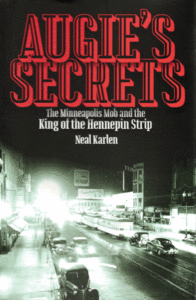Augie’s Secrets: The Minneapolis Mob and the King of the Hennepin Strip, by Neal Karlen, Minnesota Historical Society, 232 pages, $24.95
Reviewed by NEAL GENDLER
It’s a shame Neal Karlen called his 2004 autobiography Shanda, because if ever a book deserved that title, it’s this one.
Not that it’s bad; on the contrary, it’s deliciously snappy, as usual from this son of Minneapolis who writes for big-name East Coast publications. But Jewish gangsters! Of this we should be reminding people?
Augie’s Secrets tells of the 30 or so years when Jews ran a busy Minneapolis criminal underworld — indeed a shanda fur di goyim, which Karlen defines as “a scandal perpetrated by a Jew that makes all Jews look bad in the eyes of non-Jews.”
Jewish gangsters and racketeers must have been especially mortifying in what was then one of the nation’s most anti-Semitic cities. And a gangster in the family? Double shanda.
Augie Ratner, Karlen’s great-uncle, ran a speakeasy called the White Swan, and in 1943 opened Augie’s Theater Lounge, a bar with comics and strippers at 424 Hennepin Avenue — where it remains, its name amended, one of the few remnants of the Gateway clearing project that demolished downtown’s Skid Row.
Karlen’s grandmother referred to her brother Augie as a “geng-stuh,” but Karlen insists he was just a mensch who knew gangsters, even John Dillinger. They drank at his saloons — after checking their guns at the door — and they were fond of him.

Augie, the name young Sam Ratner took while a featherweight boxer, became the “King of Hennepin Avenue,” liked widely and well for his friendliness, soft-touch generosity, willingness to play the buffoon, and ability to keep the secrets he accumulated.
“Everybody loved him, which is why they told him everything,” Karlen says.
Some buffoon. Close New York friends included restaurateur Toots Shor and comic Henny Youngman, and Augie’s home was along Lake of the Isles.
The secrets are of the local underworld, called “Minneapolis Combination” or Syndicate, and the “Minneapolis Line,” a creative way of figuring sports odds and distributing them nationally. So many of these gangsters were Jews that just reading becomes embarrassing.
Karlen sprays names like a nozzle watering flowers. Many remain familiar, such as Meyer Lansky and Benjamin (Bugsy) Siegel. Others were local baddies, such as the feared Davie Berman — run out of town by young Mayor Hubert Humphrey — bootleggers Harry and Yiddy Bloom, and their brother Isadore (Kid Cann) Blumenfeld, who owned a fancy restaurant, illegally controlled multiple liquor licenses and had a reputation as a killer.
Non-gangster Sid Hartman appears several times. The impoverished downtown newsboy’s favorite spot, half a block from Augie’s bar, was Joe Doyle’s restaurant, a hangout for free-spending shady types.
Karlen quotes Hartman: “I would walk in with my papers and get half a buck, maybe a buck for a paper. I was selling two-cent newspapers and would walk out of there with ten bucks.”
One charming Augie story is about taking in a wet, shivering, hungry Norma Hegstrom, 19, six hours off a bus from Fargo. She devoured one of his giant sandwiches — a loaf of bread sliced in half and filled with goods from the North Side’s Lincoln Delicatessen. After eating, she sang “Somebody Else Is Taking My Place,” which she later made a No. 1 hit as Peggy Lee.
Karlan said Augie saw the end approaching in the late 1950s, when Italian clans began to dominate the underworld; Jewish gangsters had sent their sons to become doctors and lawyers. Augie sold the business in 1964 and lived until 1979.
Karlen learned Augie’s secrets from his physician father, who, unlike other family members, treated Augie respectfully, and he interviewed elderly people and corroborated stories with newspaper and other accounts. The result is a witty history from a writer seemingly bereft of inhibition. It’s breezy and brief but has notes, and a bibliography and index.
While Augie’s Secrets, with its spirited writing and page-turning entertainment, doesn’t seem intended as a biography, it would have been nice to learn of the inner Augie. Karlen never met him, and perhaps he was an enigma even to the author’s father. Perhaps the inner Augie was just unknowable. Or perhaps there was none.
***
Neal Gendler is a Minneapolis writer and editor.
(American Jewish World, 5.24.13)




















Comments 0